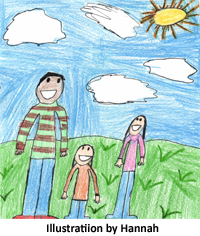
You made all the delicate, inner parts of my body, and knit them together in my mother’s womb. Thank you for making me so wonderfully complex! It is amazing to think about. Your workmanship is marvelous, and how well I know it. You were there while I was being formed in utter seclusion. (Psalm 139:13-15 TLB)
Don’t you just love this Psalm! Sometimes, I just cannot phantom how God created each individual so unique and different. Nope, there is not another person in the whole wide world just like me! Those who know me well might say, “thank goodness for that!”
Taking that uniqueness into consideration as it applies to children in grief, think about this statement:
“Each child will have a different and unique experience
all of his own when he is in grief.”
Religious beliefs – cultural traditions – family experiences – personality, perception – all play a part in how he chooses to handle his grief. Having said that, in general there are at least two things that will remain the same with children in regards to how they respond.
- Different Ages; Different Responses In his book, It’s Okay to Cry, H. Norman Wright, gives the thinking process of children in ages 5-12.
- Ages 5-8: Under the age of 5, it is sometimes difficult for a child to understand that losses are permanent. “By the age of 5, they may realize the loss is permanent, but cannot connect to it emotionally, nor do they know how to respond to it.
- Ages 9-12: Children in this age bracket are developing changes in their thinking process. They are beginning to understand the meaning of loss, as well as some of the changes that will take place as a result of the loss. However, because their thinking is still not fully developed, conclusions could be reached that are not accurate. Communicate closely with him to help him see the “bigger picture” of his loss clearly.
2. Verbal Limitations
Because of his verbal limitations, he often expresses his grief in actions which are not consistent with his age, as well as his normal behavior. You might see him exhibit unusual anger or silence. Remember also that some children are naturally quiet and not verbal; however, once they feel you can be trusted, they often open up and talk more. Don’t push, wait patiently.
A word of CAUTION to adults: Children often respond the way they think adults want them to respond, therefore asking questions that require a “Yes” or “No” answer should be avoided. Prodding a child for answers should also be avoided.
**********
When my two girls were between the ages of 5 and 9, Bill Gaither recorded a children’s song that made me cry every time I listened to it. My tears were not tears of sadness, but tears that reminded me how special God had made each of my children. I’d like to share with you the chorus of that song.
I’m something special; I’m the only one of my kind.
God made me a body and a bright healthy mind.
He had a special purpose that He wanted me to find.
That’s why I’m something special; I’m the only one of my kind.
And that, my friend, is just how special God has uniquely designed each child, even to help him process his grief.
Thanks for joining Hannah and me this week. Next week we will continue this series on ways to Support a Grieving Child. In the meantime, in the comment section, describe the different responses you have seen in your own children or the children who have been a part of your life.









